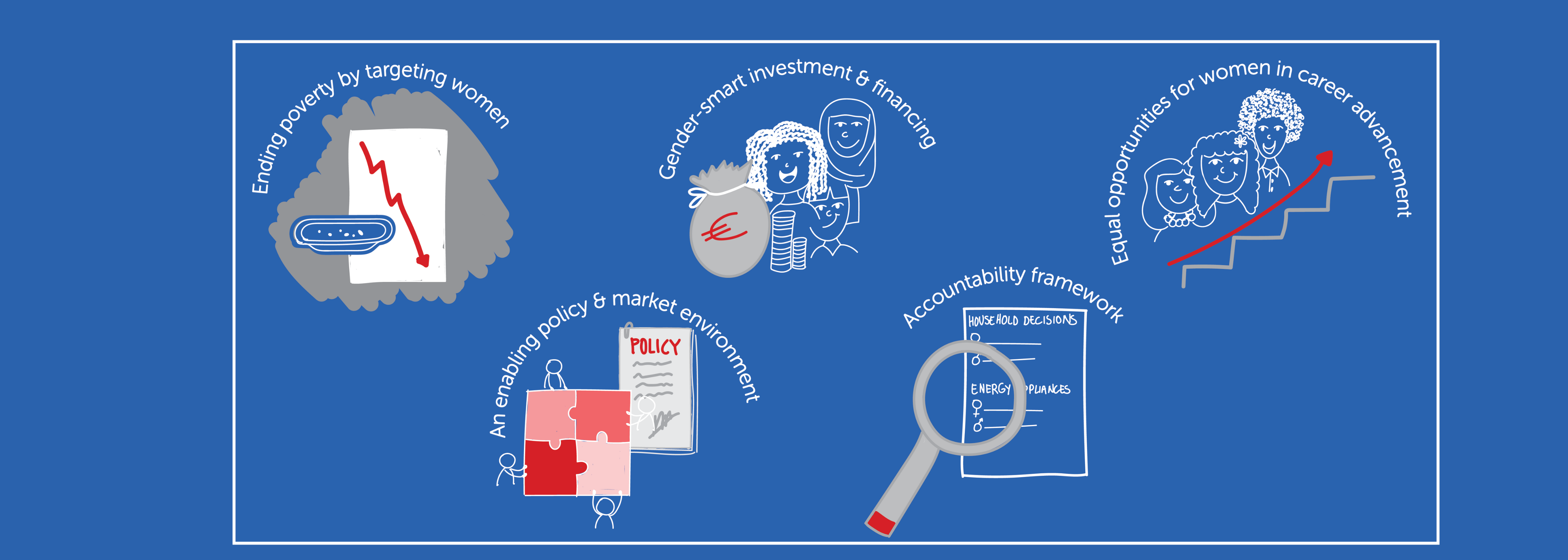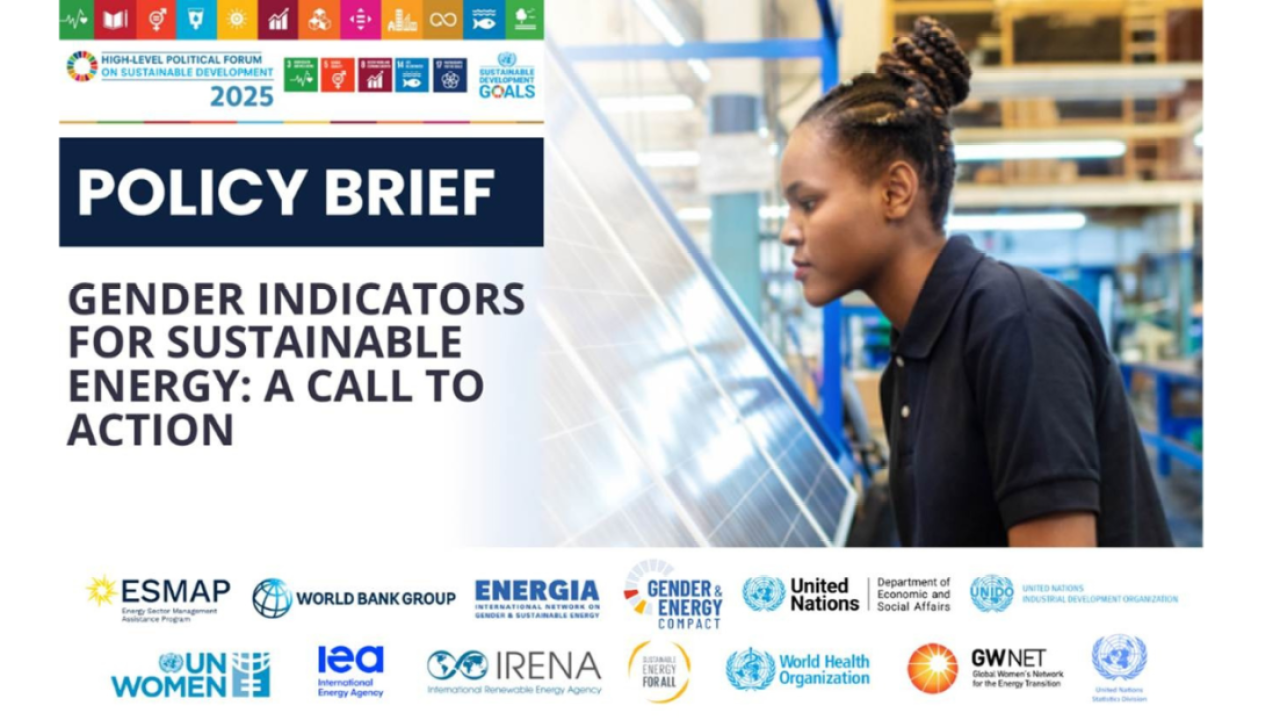By Elizabeth Cecelski, founder member of ENERGIA
Power to the people was the theme of a June 25 webinar sponsored by the SHINECollab, whose goal is scaling women-led, community-driven renewable energy solutions for a gender just energy transition. What is a gender-just energy transition, and why does it matter? Speakers debated the unjust nature of the existing energy system, and advocated for a transformational and decentralized approach to the energy transition, and to extractive industries generally, that would advance community-driven solutions.
Despite progress on energy access, energy efficiency and renewable energy, the current pace is not adequate to achieve any of the 2030 targets for SDG7 on Sustainable Energy. ENERGIA pointed out that one of the reasons for this failure to reach targets is the gender gap. Midway to Agenda 2030, with only six years left, we are embarrassed to find that energy is one of only six SDGs without any gender indicator. This is frustrating because it is well-recognized that gender equality is key to success in meeting the energy SDG targets. If the world wants to achieve and advance the SDG agenda, then linking SDG5 and SDG7 must be part of a just and inclusive transition.
ENERGIA put forward five key elements of a gender-just transition in its presentation, linking SDG 7 on sustainable energy, and SDG 5 on gender equality:
- Ending energy poverty by targeting women more intentionally. We must prioritize universal access to reliable, affordable, and sustainable energy. This means focusing on women’s increased access to and control over sustainable energy products and services. According to UN Women, unless progress accelerates, by 2030, an estimated 341 million women and girls will still lack electricity; 85 per cent will reside in sub-Saharan Africa. Access to clean cooking fuels and technology also remains out of reach for many people. Governments and the private sector are working hard to bring energy access to communities. But they are not always equipped to address the problems that women and the most vulnerable face in actually gaining access. This is where civil society and social instruments within utilities are nimbler and can reach the household level, such as ENERGIA’s technical assistance to Nepal Electricity Authority to support the utilities electrification of poor households. Civil society needs to be given the space to do this.
- Gender-smart investment and financing for women’s businesses. Counting only the work of ENERGIA and two other women led programs in the global South – Solar Sister and Frontier Markets – in less than ten years, 42,000 women entrepreneurs in Africa and Asia have been supported, and these women entrepreneurs have provided energy access to 21 million consumers in low-income communities. Yet overall, less than 13% of off-grid investment goes to female-led companies, according to the Global Off-Grid Lighting Association. Think what women entrepreneurs could do with more investment!
- Equal opportunities for women’s career advancement so they can enjoy decent and productive employment, and also advance as leaders in the energy sector. We need to encourage women in STEM education and offer equal pay. But we also need to make the work environment more favorable for women to work in, with family-friendly human resource policies and working hours, and strict policies on sexual harassment and consideration to women’s safety and mobility. How will existing disparities in the energy workforce be addressed? And further, how will the millions of women in Sub-Saharan Africa and South Asia who are employed in informal activities – ranging from procuring fuelwood, to producing charcoal, to traditional biomass and fuel crops and energy-intensive informal enterprises – be brought into the energy transition currently focused on green jobs in the formal sector?
- An enabling energy policy and market environment that champions gender equality, with pathways for women’s individual and collective agency and participation, is a necessary element, going beyond providing energy services and enlarging women’s role in the energy supply chain. Supporting governments to develop national policies and build capacity on gender mainstreaming, as ENERGIA partner Practical Action, has done in Kenya is essential. Enabling policy also means, for ENERGIA, supporting women’s leadership by transforming women’s savings and credit groups and convening the women entrepreneurs into formal registered grassroots associations that can leverage their collective agency to aggregate demand, negotiate, lobby, and influence energy markets and policies to address their needs themselves.
- An accountability framework must employ gender justice as part of a gender-just transition. This involves mandating the collection of sex-disaggregated data and monitoring gender-specific indicators in all energy and climate transition interventions, so that we know the gaps, and the progress being made.
ENERGIA continues to work at SDG level to ensure that the energy transition to 2030 and beyond will be not a risk but an opportunity for greater gender equality. We are midway to Agenda 2030 and at that time there should be an opportunity to include gender indicators in SDG7. We see an urgent need to continue to gather evidence, refine methodologies, and build national capacities on gender indicators in the energy sector – both to inform current policy and to ensure that by 2030 there is a consensus platform on at least one gender indicator to be incorporated in SDG7 post 2030. Together with UNIDO, GWNET and SEforALL, ENERGIA coordinates the multi-stakeholder Gender and Energy Compact, where gender endeavors in energy of over 91 signatories including 10 governments come together. We have the Summit for the Future in September, looking forward to post 2030, and we need to prepare collectively for this. How will women be engaged in the energy sector going forward? How can the transformation of the energy sector promote gender equality and contribute to gender justice? A just and inclusive energy transition has to include women!
Watch the recording of the SHINECollab webinar: A Gender Just Energy Transition and Why it Matters.







